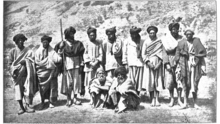Muslim Gujjars
Muslim Gujjars or Musalmān Gujjars (Punjabi: مُسَلمَان گُجَّر) are an ethno-religious group predominantly found in the north-western regions of South Asia. They embraced Islam from the medieval period onwards.[1]
 Kagan Gujars | |
| Regions with significant populations | |
|---|---|
| Languages | |
| Urdu, Panjabi, Hindi, Gujjari | |
| Religion | |
| Related ethnic groups | |
| Muslim Rajputs, Jat Muslim |
History
[edit]Origins
[edit]Gujjars are an Indo-Aryan agro-pastoral people or tribe, believed to be of either Hunnic or Scythian origins. They settled in the north-western regions of South Asia around the fourth century where they adopted Indic religions.[2]
Medieval period
[edit]Conversions of Gujjars to Islam began in the 11th century with the arrival of Sufi missionaries in the subcontinent. Numerous clans of Gujjars embraced Islam during the time of Shaykh Farid al-Din Masud and his successors.[3] By the 16th century, Islam had become the predominant religion among the Gujjars of Punjab, Kashmir, and present-day Afghanistan.[1]
Mughal period
[edit]During the Mughal era, the Gujjar tribe was notorious for their refractory and rebellious character.[4] Following Nadir Shah's invasion of the Mughal Empire, several Gujjar chiefs rose to power in Punjab, Hazara, and Kashmir. Notable among them were the Nawabs of Dera Ghazi Khan, the Rajas of Poonch, and the Muqaddams of Kot Najibullah.[5][6][7]
British period
[edit]Muslim Gujjars were actively involved in the 1857 uprising against the Company rule, particularly in the Punjab region, and were said to have given "a great deal of trouble" during the Mutiny.[8]
Later, during the British Raj era, they were classified as a martial race and enlisted in class company regiments.[9]
Demographics
[edit]In 1988, it was estimated that Muslim Gujjars constitute 53 percent of the total Gujjar population.[10]
Notable people
[edit]- Mian Muhammad Bakhsh, 19th century Punjabi Sufi poet[11]
- Chaudhari Rahmat Ali, Pakistan movement activist[12]
- Tufail Muhammad, Nishan-e-Haider recipient[13]
- Fazal Ilahi, President of Pakistan from 1973 to 1978[14]
- Shoaib Akhtar, Pakistani international cricketer[15]
- Hafiz Saeed, Pakistani islamist[16]
- Nawabzada Ghazanfar Ali Gul, Pakistani politician[17]
- Nawabzada Mazhar Ali, Pakistani politician[18]
References
[edit]- ^ a b "Punjab: a History from Aurangzeb to Mountbatten".
- ^ Brief View of the Caste System of the North-Western Provinces and Oudh.
- ^ "Journal of the Asiatic society of Bengal - Volume 6, Part 1".
- ^ "The India of Aurangzib (topography, statistics, and roads) compared with the India of Akbar: with extracts from the Khulasatu-t-tawarikh and the Chahar Gulshan".
- ^ "Report of the land revenue settlement of the Dera Ismail Khan District of the Punjab, 1872-79".
- ^ "The GUJJARS Vol 01".
- ^ "Chiefs and families of note in the Delhi, Jalandhar, Peshawar and Derajat divisions of the Panjab".
- ^ Gazetteer of the Ludhiāna District: 1888/89 [ca. 1890]. Calcutta Central Press. 1890.
- ^ Mazumder, Rajit K. (2003). The Indian Army and the Making of Punjab. Orient Blackswan. ISBN 978-81-7824-059-6.
- ^ Population Geography: A Journal of the Association of Population Geographers of India. The Association. 1988.
- ^ "Mian Muhammad Bakhsh, a great Punjabi Sufi poet".
- ^ Aziz, Khursheed Kamal (1987). Rahmat Ali: A Biography. Vanguard. ISBN 978-3-515-05051-7.
- ^ "Major Tufail Muhammad Shaheed - Inscription on Tufail Gate".
- ^ Rahi, Javaid (2012-01-01). The Gujjars Vol: 01 and 02 Edited by Dr. Javaid Rahi. Jammu and Kashmir Acacademy of Art, Culture , Languages , Jammu.
- ^ Dogra, Anshu (2011-09-16). Controversially Yours. Harper Collins. ISBN 978-93-5029-295-2.
- ^ Yasmeen, Samina (2017-10-01). Jihad and Dawah: Evolving Narratives of Lashkar-e-Taiba and Jamat ud Dawah. Oxford University Press. ISBN 978-1-84904-974-0.
- ^ Rahi, Javaid (2012-01-01). The Gujjars Vol: 01 and 02 Edited by Dr. Javaid Rahi. Jammu and Kashmir Acacademy of Art, Culture , Languages , Jammu.
- ^ Rahi, Javaid (2012-01-01). The Gujjars Vol: 01 and 02 Edited by Dr. Javaid Rahi. Jammu and Kashmir Acacademy of Art, Culture , Languages , Jammu.
